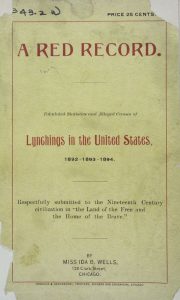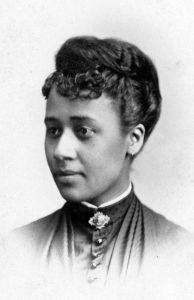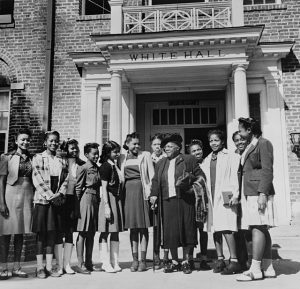“A red record” Document by Miss Ida B. Wells (1894).

An obstacle that African-American people faced during the post-Reconstruction period (and for another 50+ years) was the overwhelming violence and threat of death that they were often met with by white mobs and the Klu Klux Klan. Ida B. Wells-Barnett, born in 1862 in Holy Springs, Mississippi was a prominent journalist, researcher, and activist. Education and political activism was apart of her early life, as her parents became activists after being freed from slavery. After the lynching of a close friend, Wells began investigating white mobs and lynching cases, and published her findings in a local newspaper. In 1895, she published a 100-page pamphlet called “The Red Records”, where she described lynching in America and called for Black people to arm themselves in defense of the epidemic (NY Public Library Digital Collections).
Anna Julia Cooper, Photograph (1893)

Born in into slavery in North Carolina in 1858, Anna Julia Cooper would become one of the leading figures in the collective movement for Black women’s rights, and strongly advocated for their right to higher education. She earned B.A. and M.A. degrees from Oberlin College and later received a Ph.D in 1925 from a Paris university. During this post-Reconstruction era, Black intellectuals made efforts to gain educational resources for black communities. Anna J. Cooper delivered a monumental speech in 1893, at the World’s Congress of Representative Women, to a predominantly white audience. In this speech she describes the conditions of lives of African-American women since slavery, and the progress they have made. She also makes a call for the continuation of co-ed schools, schools for Black children and adults, and intellectual engagement.
Mary McLeod Bethune with a group of students at Bethune-Cookman College, Photograph (1943)

Mary McLeod Bethune established a Presbyterian parochial school in Florida in 1900, then in 1902, opened an independent school with social services and the selling of life insurance (Boukari 2005, 14). In 1904, she founded the Daytona Educational and Industrial Institute, with support from black and white people. This school educated young girls and grew larger by 1923, to become co-education and a junior college. Today, it is known as the Bethune-Cookman University, and is a historically Black college university located in Daytona Beach, Florida.
